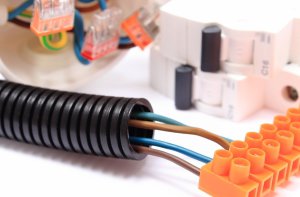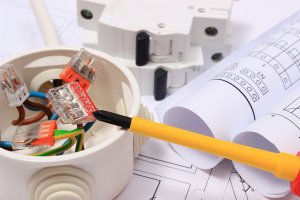-
A Look at How Fuses Work
Fuses, like circuit breakers, are designed to protect electrical wiring in San Jose by interrupting excessive electrical currents caused by, among others: overloaded outlets, malfunctioning devices, and short circuits. Though they may be rather simple things, fuses provide a very important service. Here’s a look at how they work.
How Fuses Work
Like the filament in an incandescent light bulb, fuses have thin wires that electricity can flow through. These wires are designed to carry a specific amount of electricity safely—the thicker the wire, the higher the current it can support. When an excessive electrical current attempts to pass through this wire, it heats up the wire to the point of melting or burning. This destroys the wire and interrupts the circuit. In the case of burning, the wire gets very hot very quickly, and it blows out, producing a loud and characteristic popping sound. When a fuse is blown, it needs to be replaced.
wires are designed to carry a specific amount of electricity safely—the thicker the wire, the higher the current it can support. When an excessive electrical current attempts to pass through this wire, it heats up the wire to the point of melting or burning. This destroys the wire and interrupts the circuit. In the case of burning, the wire gets very hot very quickly, and it blows out, producing a loud and characteristic popping sound. When a fuse is blown, it needs to be replaced.Which Size to Use
Fuses come in a range of sizes and amperages. Generally, you want to replace a blown fuse with one that has a similar rating—i.e. a five-amp fuse with a five-amp fuse. If you’re not sure which kind of fuse to use, you can use your discretion based on logic. Since large appliances and devices tend to need more electricity to operate, they most likely require larger fuses. Likewise, smaller devices require smaller fuses. If you’re uncomfortable making a decision, contact a qualified electrician for assistance. Using a small fuse for something that draws a large current will blow out the fuse quickly. Using a large fuse for something that draws a small current will overwhelm it and can cause a dangerous situation.How Fuses Differ From Circuit Breakers
Both fuses and circuit breakers protect homes from electrical mishaps. Unlike fuses, circuit breakers have reusable mechanisms that, when tripped, cut-off power to outlets. These mechanisms can be easily reset once they are tripped. Circuit breakers can also be used in conjunction with ground-fault circuit interrupters (GFCI). Fuses are the more economical choice of the two. They are more sensitive than circuit breakers, which may or may not be useful depending on their application. They also tend to be more prominent in older homes. -
Repairing Aluminum Wiring in San Jose
In the 1960s, copper prices skyrocketed in America, causing residential electricians and homeowners to turn to aluminum as a cheaper alternative. Unfortunately, aluminum wiring really is not compatible with older electrical outlets and switches in homes and has a high potential to cause house fires. If you happen to know that your home is wired with aluminum, you should consider calling an electrician serving San Jose to have your wiring repaired or replaced.
One way to repair aluminum wiring is to replace it with copper wiring completely. Otherwise, the U.S. Consumer
 Product Safety Commission (CPSC) approves two repair methods that involve splicing new copper wires into existing aluminum ones. The more expensive method utilizes specialized connectors called COPALUM, which is considered to be reliable and permanent. The other repair method uses a smaller lug-type connector called AlumiConn. For peace of mind and safety reasons, hire a certified electrical contractor to perform any of the jobs mentioned. That way, you’ll know it’s done correctly. Contact Delta Electric today!
Product Safety Commission (CPSC) approves two repair methods that involve splicing new copper wires into existing aluminum ones. The more expensive method utilizes specialized connectors called COPALUM, which is considered to be reliable and permanent. The other repair method uses a smaller lug-type connector called AlumiConn. For peace of mind and safety reasons, hire a certified electrical contractor to perform any of the jobs mentioned. That way, you’ll know it’s done correctly. Contact Delta Electric today! -
Top Tips for Hiring an Electrical Contractor in San Jose
Choosing the right electrical contractor in San Jose may seem like a daunting task at first, because you’re at the mercy of professionals who know more about electrical work than you do. However, the process doesn’t have to be hard. With a little ingenuity on your part and these helpful tips, you can rest assured that you’ll be able to hire the right person for your project.
Do Some Research
With all the information out there online, you’d do yourself a disservice if you didn’t do any research. Start by reading reviews and consumer reports on reputable review websites. Some other great resources are your trusted friends and relatives. Ask them if they can make any suggestions or if they know of electricians they’d happily recommend based on their satisfied experiences.
reading reviews and consumer reports on reputable review websites. Some other great resources are your trusted friends and relatives. Ask them if they can make any suggestions or if they know of electricians they’d happily recommend based on their satisfied experiences.Get Multiple Quotes
Don’t choose to go with the first electrician you contact. Be prepared to talk with several contractors before making a decision. The rule of thumb is to get at least three quotes. That way, you’ll have a good basis for comparison. Though pricing is an important factor, it shouldn’t be the only driving force. Some contractors who present the lower bids may skimp on materials and labor, which may affect the quality of the work performed.Have Questions Ready to Ask an Electrical Contractor
Before you hire an electrician at Delta Electric, you need to be sure that he or she will be dependable. Since you’re the employer in this instance, you need to conduct a few interviews to find the right contractor for the job. Here are some key questions to ask him or her: Are you licensed to work in the city or state? How long have you been in the business? What are your qualifications? Do you guarantee your work and will it meet municipal code? Will your work comply with the National Electrical Code (NEC) and the National Electrical Installation Standards (NEIS)?Be Sure to Get Everything in Writing
When dealing with an electrician, or any other contractor, be sure to get everything regarding your project in writing. This includes the estimate, project proposal, contract, warranties, and anything discussed and agreed upon between you and your electrician. Review all documents thoroughly to ensure that things are correct and in order. Also, request a copy of his or her insurance certificate for your records. Schedule a call today for more information!
RECENT POSTS
categories
- Uncategorized
- Delta Electric
- Commercial Electrical
- Residential Electrical
- Electric Circuits
- Dedicated Circuits
- Circuit Breakers
- Electrical Panels
- Electrical Wiring
- Safety Inspections
- copper wires
- Electrician San Jose
- Trained Electricians
- Electrical Services San Jose
- Malfunctioning Electrical Outlets
- Circuit Breaker
- Grounding
- safety
- Flickering Lights
- Arc Fault Breakers
- electrical system
- Aluminum Wiring
- Circuit Interrupters
- House Surge Protection
- Zinsco Panel Warnings
- Wiring Conversion
- GFCI outlet
- professional electrician
- Knob-and-Tube Wiring
- modern home electrical system
- Fuses
Archives
2025
2024
2023
2018
2017
- December (4)
- November (4)
- October (5)
- September (4)
- August (4)
- July (4)
- June (4)
- May (4)
- April (4)
- March (3)
- February (4)
- January (3)
2016
- December (3)
- November (4)
- October (4)
- September (4)
- August (4)
- July (4)
- June (4)
- May (4)
- April (4)
- March (4)
- February (4)
- January (4)
2015
- December (4)
- November (4)
- October (4)
- September (4)
- August (3)
- July (4)
- June (4)
- May (3)
- April (4)
- March (4)
- February (2)
2014
- December (3)
- November (4)
- October (4)
- September (6)
- August (2)
- July (3)
- May (2)
- April (1)
- March (2)
- February (1)
- January (1)

